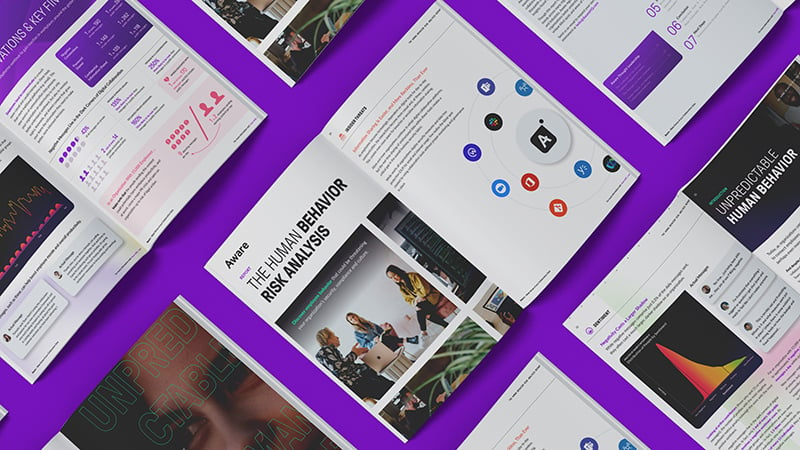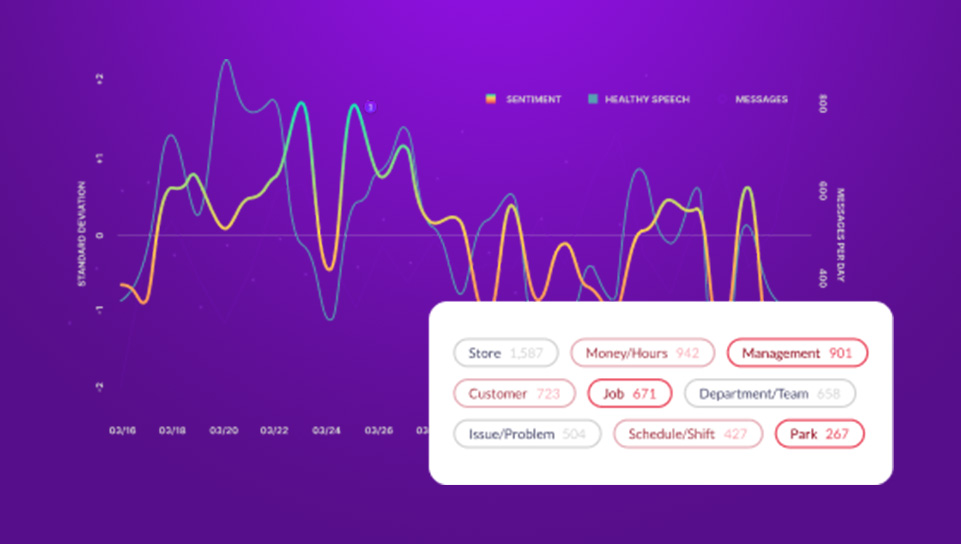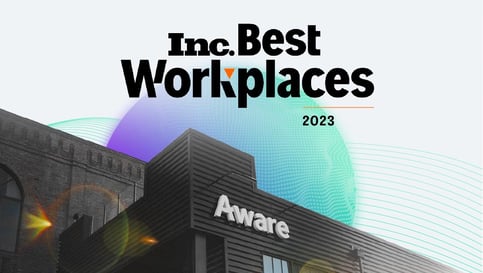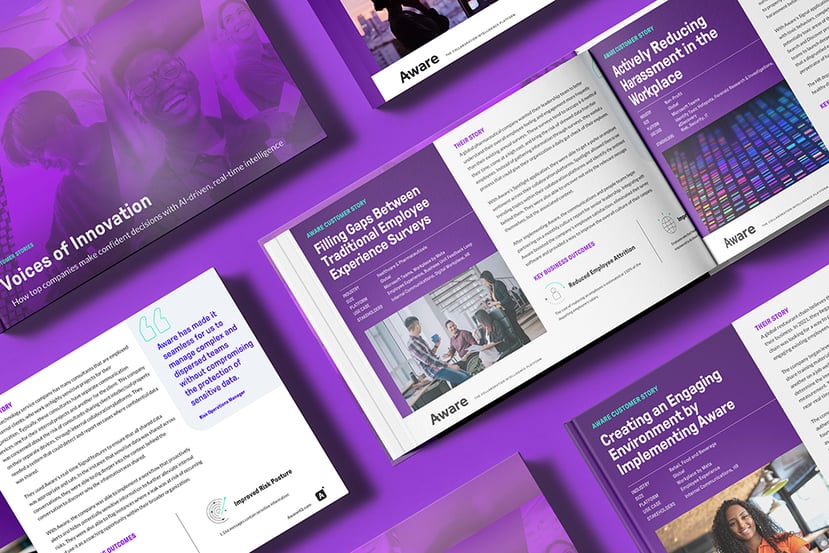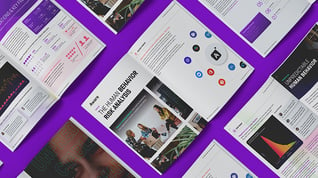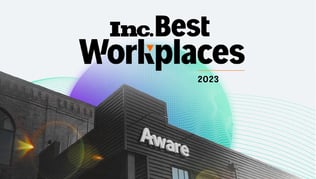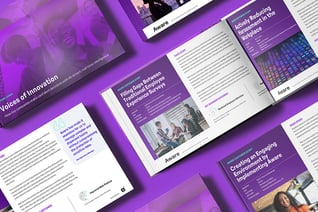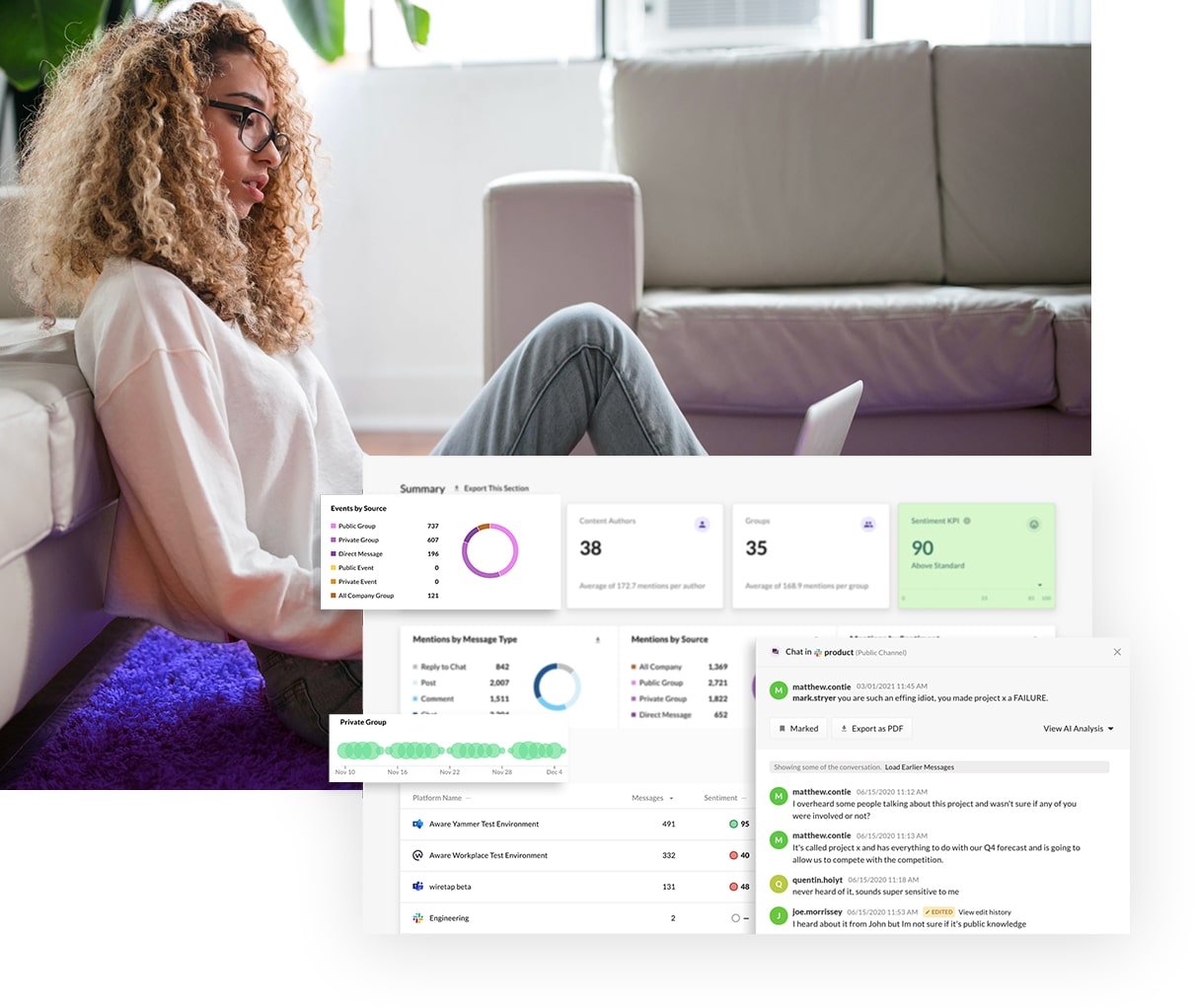The Complete Guide to Data Loss Prevention in Workplace from Meta
by Aware
First Published Aug. 2023. Updated Mar. 2024.
Meta Workplace is shutting down on August 31, 2025. Learn what you can do to prepare for a successful transition.
Anywhere your employees communicate, your valuable business data could be at risk. That includes historically overlooked collaboration tools and community platforms like Workplace from Meta. It’s essential for workspace admins to understand the risks associated with cloud-based applications like Workplace and how to prevent data loss within them effectively. This post explores the need for DLP for Workplace from Meta and provides actionable steps to mitigate the risks of data breaches.
Contents
- What is Workplace from Meta?
- Is Workplace from Meta the same as Facebook
- 5 information security risks of using Meta Workplace
- What sensitive information does Workplace from Meta hold?
- Is DLP possible in Workplace from Meta?
- How does Meta Workplace secure user data?
- How can administrators protect their data in Workplace?
- 5 steps to mitigate the risk of a data breach in Meta Workplace
- How does Aware support DLP in Meta Workplace?
What is Workplace from Meta?
Workplace from Meta is a business social networking tool. Using Workplace, organizations can support internal communications and company culture-building in a restricted environment limited to their employees. Using Workplace, coworkers can connect across different locations to share information and work collaboratively. The platform is especially popular among companies with large frontline teams for its ability to foster better communication and cohesion.
Is Workplace from Meta the same as Facebook?
Both Workplace and Facebook are Meta products are built on the same framework, and as such they look like very similar platforms. However, while Facebook is a publicly available social network designed for personal use, Workplace is focused on professional communication and collaboration.
The similarities between the platforms make Workplace an attractive solution for organizations looking for an enterprise social network, as the majority of employees are already familiar with how it works. This means higher adoption rates and shorter onboarding times. In addition, Workplace also offers many features that enhance its value for business users, such as integrations with productivity and security tools.
5 information security risks of using Meta Workplace
Workplace offers businesses many benefits in supporting how employees connect and work together, but the platform also presents risks to the organization that must be addressed. The information held within Workplace is often sensitive, proprietary, and confidential, and administrators must be proactive in preventing unauthorized access or exfiltration. The following are the top risks to that data that information security officers must consider to protect their data in Workplace.
- Phishing & Social Engineering Attacks: Malicious actors may target employees with phishing emails or messages to steal login credentials, or pose as a supervisor or IT representative to gain access to employee accounts.
- Multi-Factor Authentication Fatigue Attacks: Multi-factor authentication can protect a digital workspace but if outside actors gain access to employee login information, they can still hack the account by sending repeated MFA approval requests until the employee accepts one.
- Insider Threats: Employees with malicious intent might misuse their access to steal or leak sensitive information. These bad actors can be some of the most difficult to stop because they have legitimate access to the Workplace account.
- Unsecured Integrations: Integrations with third-party apps could potentially expose sensitive data if not properly secured. Before connecting any new application to Workplace, admins should thoroughly vet it to be sure it meets their information security standards, and routinely audit connected apps for updates and weaknesses.
- Device Vulnerabilities & Weak Credentials: If employees access Workplace from unsecured devices, choose weak passwords, or reuse passwords that have been compromised, they might inadvertently expose company data to risks.
What sensitive information does Workplace from Meta hold?
While the information held within a corporate social network might not seem particularly sensitive, Aware research shows that significant risks lurk within this dataset. Information about internal policies and procedures, upcoming events, staffing changes and more could damage a company’s reputation or cost it a market advantage if that data became public in an uncontrolled way. Additionally, digital social tools can provide cover for harassment, toxicity, and other unwanted behaviors that, unchecked, can leave the enterprise open to risk.
Some examples of regulated data often found in Workplace from Meta include:
- Personally identifying information (PII) such as full names, dates of birth, and contact details
- Protected Health Information (PHI) including details of diagnoses and ongoing treatment
- Payment Card Industry (PCI) data like card numbers, CVV and PIN codes, and bank information
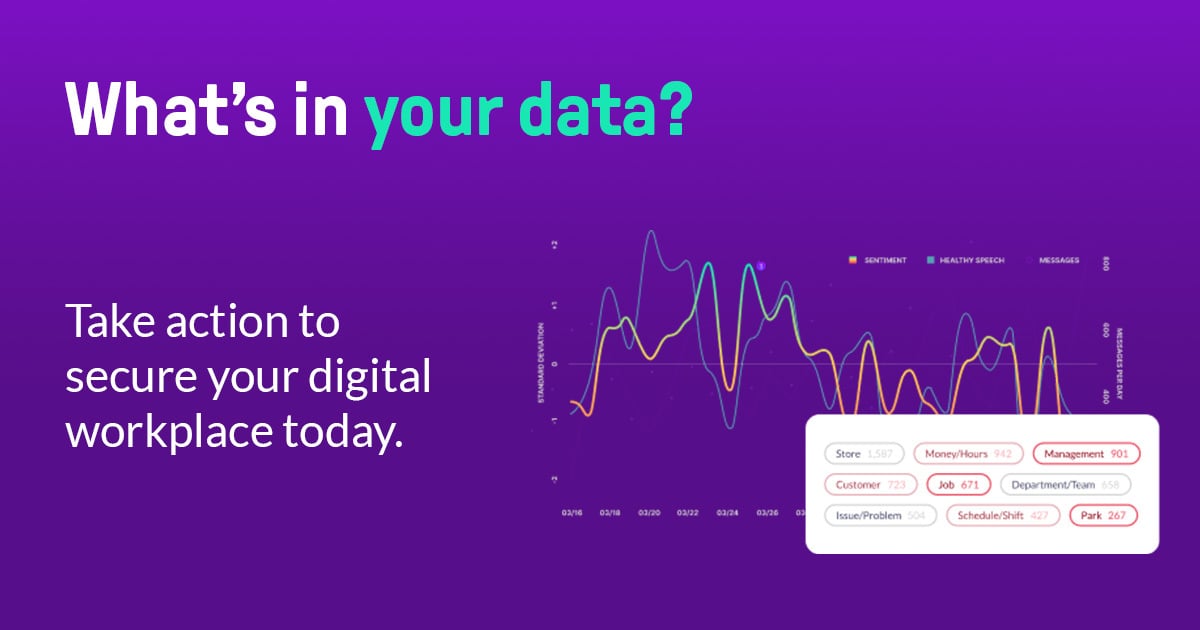
Discover what sensitive information lurks in your collaboration data.
Is DLP possible in Workplace from Meta?
Yes, Data Loss Prevention (DLP) is possible in Workplace from Meta. DLP solutions aim to identify, monitor, and protect sensitive information from being shared inappropriately. While Workplace offers certain security features, organizations should also implement additional DLP measures to safeguard their data effectively.
A successful DLP strategy for Workplace includes both establishing the right permissions and safeguards within Workplace, deploying a third-party DLP tool to add an additional layer of security, and routinely training employees on DLP best practices. By taking this three-pronged approach, administrators can mitigate the risk of a data breach from Workplace.
How does Meta Workplace secure user data?
Meta Workplace employs a range of privacy, security, and compliance measures to protect user data. These include encryption in transit, SAML single sign-on (SSO), 2-factor authentication (2FA), and role-based access controls (RBAC). Additionally, Workplace adheres to industry standards and regulations to ensure the highest level of security, including ISO IEC 27001, ISO IEC 27018, SOC 2, and SOC 3.
With the right policies and settings configurations, Workplace supports GDPR and HIPAA compliance and protects sensitive data from unauthorized access or exfiltration.
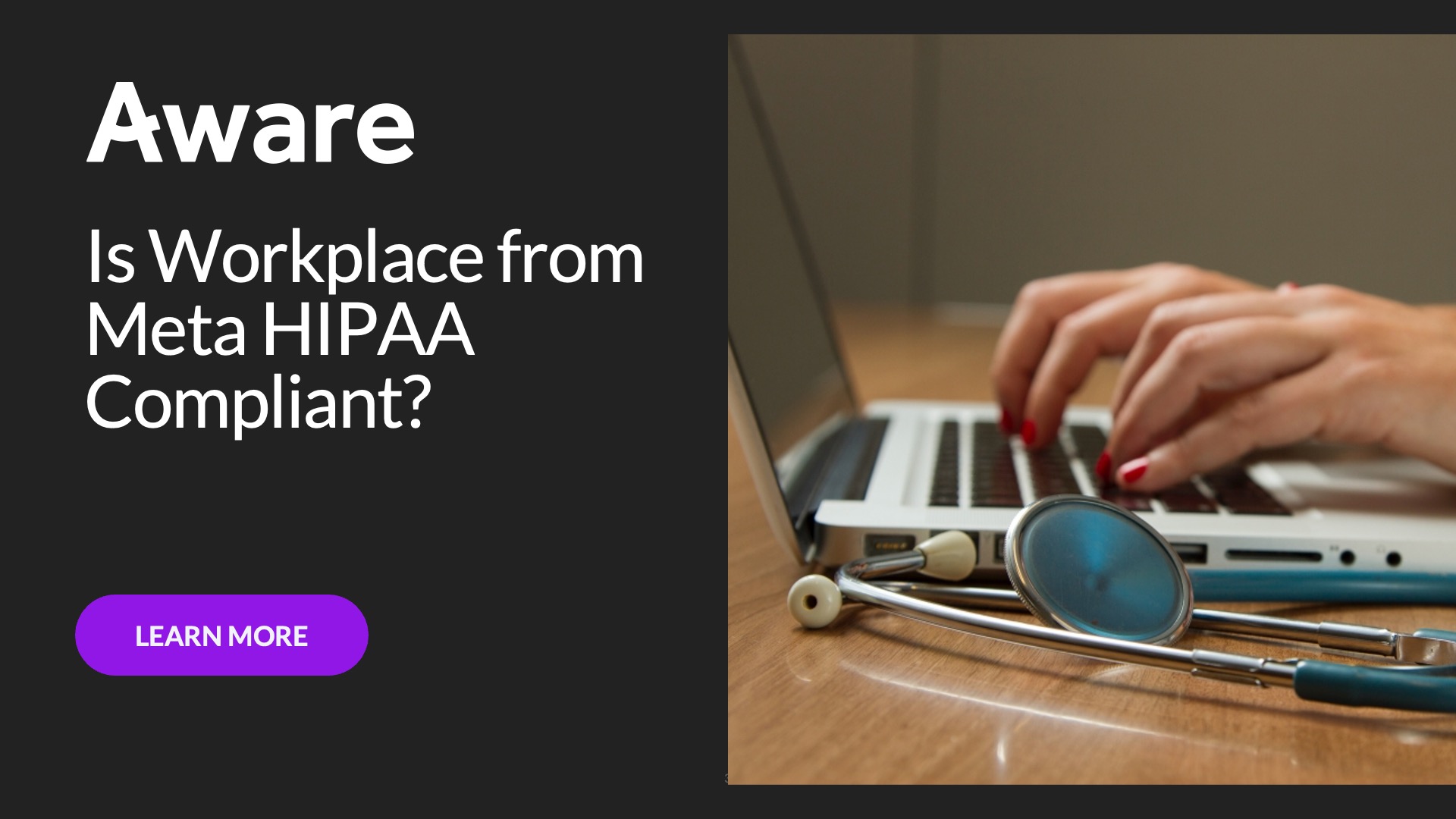
Read More: HIPAA Compliance in Workplace from Meta
How can administrators protect their data in Workplace?
The administrators of any cloud-based SaaS application are ultimately responsible for the security of the data it contains, and Workplace from Meta is no exception. Admins must consider how to enable DLP in Workplace and proactively protect their data through information security best practices. These include configuring the right permissions and settings in Workplace to limit unauthorized access, training users on what data is and isn't appropriate to share and how to keep their accounts secure, and conducting regular audits to identify security gaps or suspicious activity.
5 steps to mitigate the risk of a data breach in Meta Workplace
- Educate Employees: Regularly train your staff on security best practices, including recognizing phishing attempts and using strong passwords.
- Implement Access Controls: Assign roles and permissions carefully, granting access only to those who need it.
- Monitor User Activity: Keep an eye on user behavior for any anomalies or unauthorized access.
- Secure Integrations: Ensure that third-party integrations are secure and comply with your organization's security standards.
- Regular Audits: Conduct regular security audits to identify vulnerabilities and address them promptly.
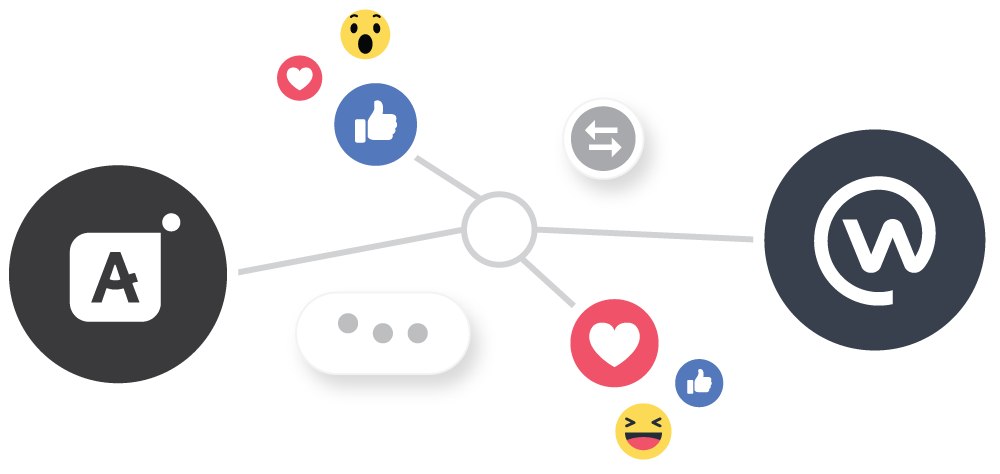
How does Aware support DLP in Meta Workplace?
Aware supports administrators in securing data in Workplace with comprehensive DLP protections designed to identify sensitive data and unauthorized information-sharing. Enhanced artificial intelligence and machine learning workflows analyze Workplace messages in real time to detect instances of enhanced risk and take automated action of notify stakeholders, coach employees, and mitigate risk.
Using Aware, organizations can make deliberate, informed decisions about the value of the data they hold within Workplace and set archiving and retention policies that improve their compliance posture and reduce the risk of a data breach or security incident. And Aware captures a complete record of all messages, including edits and deletions, reducing the opportunity for malicious actors or hackers to act unseen.
In addition to comprehensive DLP controls for Workplace from Meta, Aware also provides business leaders with advanced sentiment analysis based on proprietary, industry-leading natural language processing (NLP). Aware uses this technology to enrich every Workplace message with AI-infused metadata that makes the digital workspace more accessible and contextual, shining a light on shifts in patterns of behavior that can be early indicators of insider threats.
Meta's Workplace presents a powerful platform for enhancing workplace collaboration, but it also comes with information security risks. By understanding these risks, educating employees, and teaming infosec best practices with advanced AI protections only available from the Aware data platform, organizations can maximize the benefits of Workplace while safeguarding their sensitive data from potential breaches.
Learn more about how Aware supports DLP, compliance, governance and more for Workplace from Meta.
